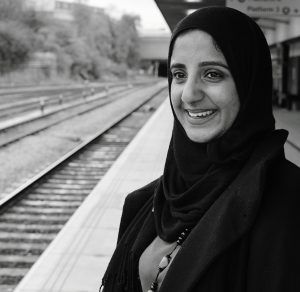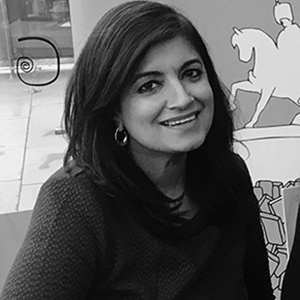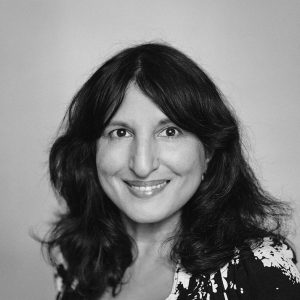The following is a series of writing prompts, put together by Rhiya Pau, following the prompt workshop she ran in April 2024. Please use it, be inspired, and, when you’re ready, answer the open call.
Download as a PDF (right-click, save target as/save linked file as) here.
Third Space Prompts
In Solidarity: Motif, Metaphor & Movement, with Rhiya Pau
How should we think about the bounds of solidarity?
Remember: “There’s no such thing as the voiceless. Only the deliberately silenced and the preferably unheard.” [Arundhati Roy]. Solidarity is not about speaking for people, it’s about supporting them, making space and platforming them.
“What is this greed of wanting more,
of baking four and twenty blackbirds in a pie
and expecting them to sing, when you know
that a twelve-year-old girl, who makes her living
picking chilies, has just died of exhaustion
walking home? And as you learn her name,
Jamalo, and are figuring out how to mourn
her, someone else will say, Look,
the flamingos have returned to Bombay.
Look how this carpet of pink brightens
the day. It’s the difficulty of reconciliation.
This with that. Jack and his box.
The continual threat of being startled.” [Tishani Doshi]
Writing in solidarity in a way that ties the specificity of our experiences to the universality of the movement, is an incredibly powerful approach. It’s a way of adding momentum. In a world where power is highly concentrated, sometimes all we have is momentum, volume, bodies, mass, to change our political trajectory, to be a force to be reckoned with (f = ma).
Solidarity often comes from a place of intense emotion and empathy, these emotions can be overwhelming and to the point of inaction and nihilism. Hannah Arendt draws the distinction between ‘there are no words’, and ‘I have no words’ – if I have no words, I am still there to regain them in the future, but where there are no more words, the violence of non-verbalisation is absolute. Where there are no more words there are no more things, there are no more worlds. Writing in solidarity is also a poetry of witness.
PART 1
- What symbols and motifs do you associate with solidarity?
- List sensory adjectives you associate with each symbol? Get creative, perhaps these are associations only you might make
- What symbols and motifs do you associate with South Asian culture?
- List values you associate with each symbol? Get creative, perhaps these are associations only you might make
- Make a map of words you associate with the symbols, adjectives and values. Put each word in proximity to others based on the strength of association. Can you find any parallels and connections between them? Does anything there surprise you?
PART 2
Poetry is all about emotion “a poem is a unit of feeling, that in its singular form makes you quiver” [Ankita Saxena]. The emotions that drive us to activism are very strong, they can be overwhelming, when we feel them entirely cerebrally. This next practice is one I’ve adapted from a friend Sunny Pfalzer. I find it helpful in processing my emotions somatically, and overriding my usual neural pathways when it comes to writing and language. It involves three ten minute sections, but feel free to adjust as you need to. I encourage you to read the full instructions before you begin.
Instructions
Think about a cause you care about – something that worries you about the state of the world. Think about the last time you experienced emotions related to that cause, maybe an incident you experienced, a conversation about the cause, an article you read etc. Now think about how you would feel if that cause was entirely resolved, and all your worry and anxiety about it disappeared.
- Move for 10 minutes: stretch, dance, wriggle, massage your head or your arms, get up and dance – the idea is to move continuously but it can be in a small or large way. 10 mins may feel uncomfortable but just keep going, focus on different parts of your body, use your space, make noise if you feel called to do so. Notice any discomfort, notice the pace of your emotions. A good poem is about unlocking the reader’s emotion at the right pace so when we reflect on this exercise we will think about translating the pace of emotion to the page
- Read for 10 minutes: I want you to try and read without judgment, without emotion. Just focus on the words, notice the language, the power of sentence structure, vocabulary, rhyme. In this exercise, we’re tricking our brain to move away from meaning and towards craft. The meaning will be there in your subconscious and we’ll see what it unlocks in the free write. You can read anything you have to hand, but I’m also sharing the following links to some of my favourite works by SA writers – you can read the beginning of these through the Amazon sample feature. [Azadi by Arundhati Roy, A Fine Balance by Rohinton Mistry, A God at the Door by Tishani Doshi]
- Write for 10 minutes: The only rule here is keep your pen on the page. It doesn’t have to make sense!
How did you find the exercise? What did you find easy/difficult? Did you feel/think different things during different parts of the exercise? Did you feel like you were writing from a different place than usual? Did anything come up related to symbols of solidarity and SA culture?
About Rhiya
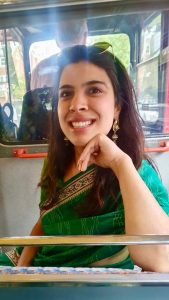 Rhiya Pau’s debut collection, Routes (Arachne Press, 2022), commemorates fifty years since her family arrived in the UK, chronicling the migratory history of her ancestors and navigating the conflicts of identity that arise within the East African-Indian diaspora. Routes was awarded an Eric Gregory Award from the Society of Authors in 2022. Rhiya won the Creative Future Writers’ Award in 2021 and her poem ‘Salutation’ was highly commended in the 2023 Forward Prize. She has had work published in Wasafiri, The Liminal Transit Review, Token Magazine and the Off the Chest Anthology, among other places. Rhiya is also one half of ORIGINS Poetry Duo, who write and perform collective poetry that does away with “ownership” and “linearity” to decentralise and decolonise the traditional project of history.
Rhiya Pau’s debut collection, Routes (Arachne Press, 2022), commemorates fifty years since her family arrived in the UK, chronicling the migratory history of her ancestors and navigating the conflicts of identity that arise within the East African-Indian diaspora. Routes was awarded an Eric Gregory Award from the Society of Authors in 2022. Rhiya won the Creative Future Writers’ Award in 2021 and her poem ‘Salutation’ was highly commended in the 2023 Forward Prize. She has had work published in Wasafiri, The Liminal Transit Review, Token Magazine and the Off the Chest Anthology, among other places. Rhiya is also one half of ORIGINS Poetry Duo, who write and perform collective poetry that does away with “ownership” and “linearity” to decentralise and decolonise the traditional project of history.


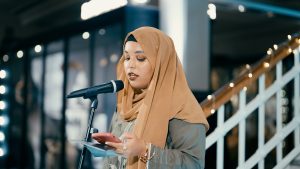 Zainab Imran is a poet, zine-maker and facilitator of British Pakistani heritage based in Scotland. Now completing her Creative Writing Masters at the University of St Andrews, he writes on a multitude of racial issues, with a particular focus on the diaspora and the hidden stories of women in the colonial struggle and post-colonial journeys to the West. In 2022, they were awarded the Royal Society of Literature and Sky Arts Award for Poetry as an emerging writer of colour, through which she was mentored by Jay Bernard, and was part of the Words a Stage 2.0 cohort with Apples and Snakes. Zainab is now working towards beginning his Creative Writing PhD and producing a dissertation of poetry retelling the Oresteia through the setting of India’s Partition.
Zainab Imran is a poet, zine-maker and facilitator of British Pakistani heritage based in Scotland. Now completing her Creative Writing Masters at the University of St Andrews, he writes on a multitude of racial issues, with a particular focus on the diaspora and the hidden stories of women in the colonial struggle and post-colonial journeys to the West. In 2022, they were awarded the Royal Society of Literature and Sky Arts Award for Poetry as an emerging writer of colour, through which she was mentored by Jay Bernard, and was part of the Words a Stage 2.0 cohort with Apples and Snakes. Zainab is now working towards beginning his Creative Writing PhD and producing a dissertation of poetry retelling the Oresteia through the setting of India’s Partition. Rhiya Pau’s debut collection, Routes (Arachne Press, 2022), commemorates fifty years since her family arrived in the UK, chronicling the migratory history of her ancestors and navigating the conflicts of identity that arise within the East African-Indian diaspora. Routes was awarded an Eric Gregory Award from the Society of Authors in 2022. Rhiya won the Creative Future Writers’ Award in 2021 and her poem ‘Salutation’ was highly commended in the 2023 Forward Prize. She has had work published in Wasafiri, The Liminal Transit Review, Token Magazine and the Off the Chest Anthology, among other places. Rhiya is also one half of ORIGINS Poetry Duo, who write and perform collective poetry that does away with “ownership” and “linearity” to decentralise and decolonise the traditional project of history.
Rhiya Pau’s debut collection, Routes (Arachne Press, 2022), commemorates fifty years since her family arrived in the UK, chronicling the migratory history of her ancestors and navigating the conflicts of identity that arise within the East African-Indian diaspora. Routes was awarded an Eric Gregory Award from the Society of Authors in 2022. Rhiya won the Creative Future Writers’ Award in 2021 and her poem ‘Salutation’ was highly commended in the 2023 Forward Prize. She has had work published in Wasafiri, The Liminal Transit Review, Token Magazine and the Off the Chest Anthology, among other places. Rhiya is also one half of ORIGINS Poetry Duo, who write and perform collective poetry that does away with “ownership” and “linearity” to decentralise and decolonise the traditional project of history.